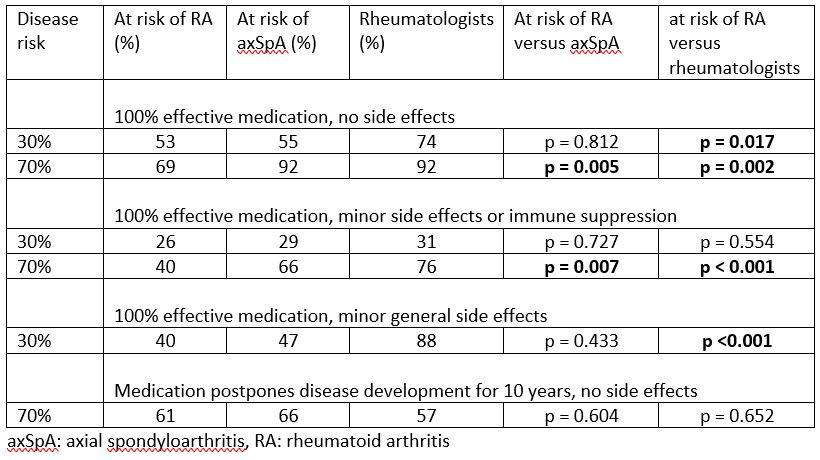Session Information
Date: Monday, November 9, 2020
Title: RA – Diagnosis, Manifestations, & Outcomes Poster IV: Lifespan of a Disease
Session Type: Poster Session D
Session Time: 9:00AM-11:00AM
Background/Purpose: Persons at risk of developing rheumatoid arthritis (RA) may benefit from lifestyle1 or pharmacological2 interventions aimed at primary prevention. Although less studied, the same may apply to persons at risk of axial spondyloarthritis (axSpA)3. Our aim was to investigate and compare the willingness of individuals at risk of RA or axSpA and rheumatologists to initiate preventive intervention.
Methods: Individuals at risk of RA (arthralgia and anti-citrullinated protein antibodies (ACPA) and / or rheumatoid factor (RF) positivity without arthritis (RA risk cohort; n=100)), healthy first degree relatives of HLA-B27 positive axSpA patients (SpA risk cohort; n=38) and Dutch rheumatologists (n=49) completed a survey on preventive intervention in the at risk phase of RA (RA risk cohort and rheumatologists) or axSpA (SpA risk cohort) which included questions on disease perception, lifestyle intervention (i.e. smoking, alcohol consumption, exercise and various dietary changes) and preventive medication4.
Results: Participants considered RA and axSpA to be a serious disease (median VAS (0-10) 6.5 (RA) and 6 (SpA)). Despite some concern about their increased risk, most did not expect to develop the disease (median VAS 3 for both). Participants were willing to change a median of 7 out of 13 lifestyle components in multiple areas, whereas only 35% of rheumatologists gave lifestyle advice to >50% of at risk patients. The willingness to use 100% effective preventive medication without side effects was 53% (RA), 55% (SpA) and 74% (rheumatologists) at a 30% disease risk. This increased to 69% (RA) and 92% (SpA and rheumatologists) at a 70% disease risk. With minor side effects, willingness was 26%, 29% and 31% (30% risk) versus 40%, 66% and 76% (70% risk), respectively. Differences are shown in table 1.
Conclusion: Disease risk perception and willingness to start preventive intervention are similar between patients at risk of RA or axSpA. They seem highly willing to make several lifestyle changes to decrease disease risk and are generally willing to use medication in case of a clearly increased risk. Rheumatologists are overall more likely than at-risk patients to start preventive medication. Lifestyle advice was not given by the majority of rheumatologists contrasting with patients’ high willingness to adjust lifestyle.
1 Zaccardelli A et al. Clin Ther. 2019;41(7):1323-45
2 Cope AP et al. Clin Ther. 2019;41(7):1299-311
3 Brown MA et al. Ann Rheum Dis. 2000;59(11):883-6
4 de Winter et al. Clin Rheumatol. 2019 Mar;38(3):755-759
 Table 1. Willingness to start preventive medication
Table 1. Willingness to start preventive medication
To cite this abstract in AMA style:
van Boheemen L, Bolt J, ter Wee M, de Jong H, van de Sande M, van Schaardenburg D. Patients’ and Rheumatologists’ Perceptions on Preventive Intervention in Rheumatoid Arthritis and Axial Spondyloarthritis [abstract]. Arthritis Rheumatol. 2020; 72 (suppl 10). https://acrabstracts.org/abstract/patients-and-rheumatologists-perceptions-on-preventive-intervention-in-rheumatoid-arthritis-and-axial-spondyloarthritis/. Accessed .« Back to ACR Convergence 2020
ACR Meeting Abstracts - https://acrabstracts.org/abstract/patients-and-rheumatologists-perceptions-on-preventive-intervention-in-rheumatoid-arthritis-and-axial-spondyloarthritis/
